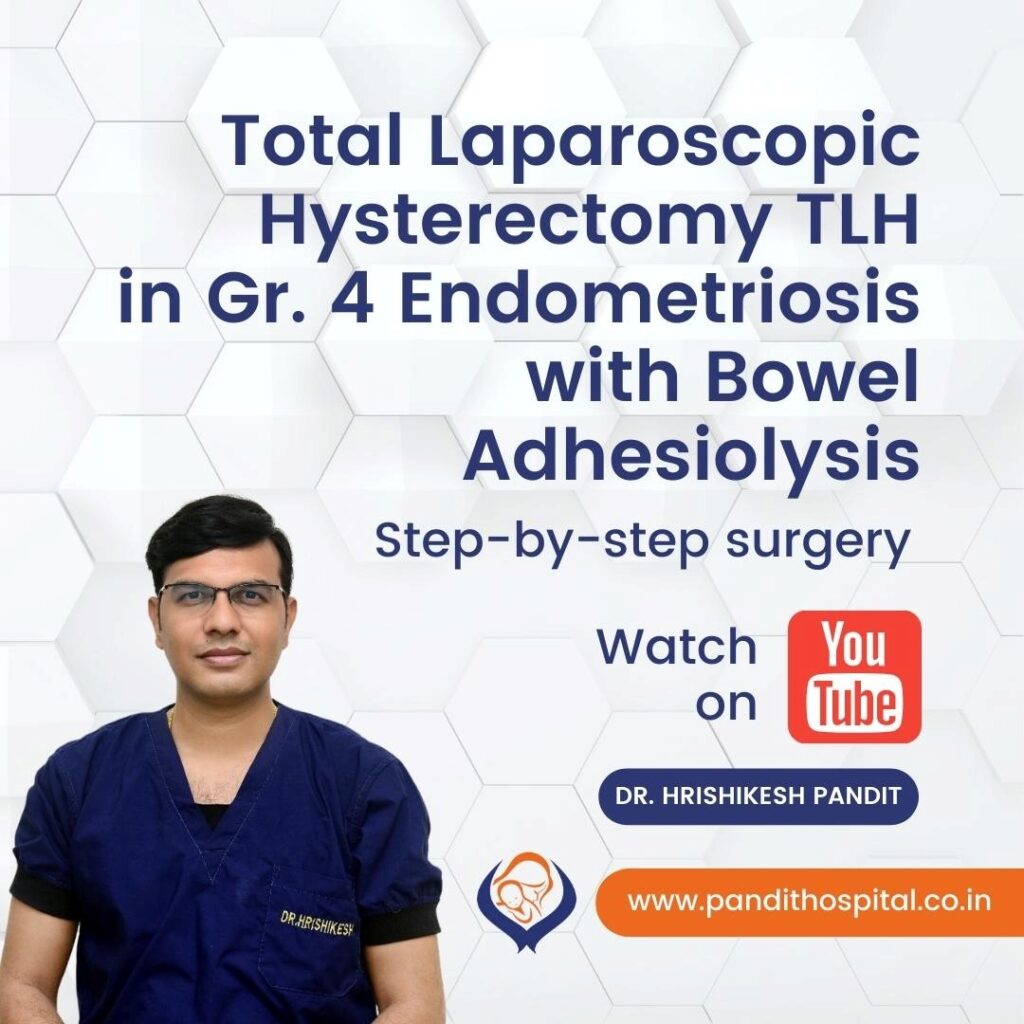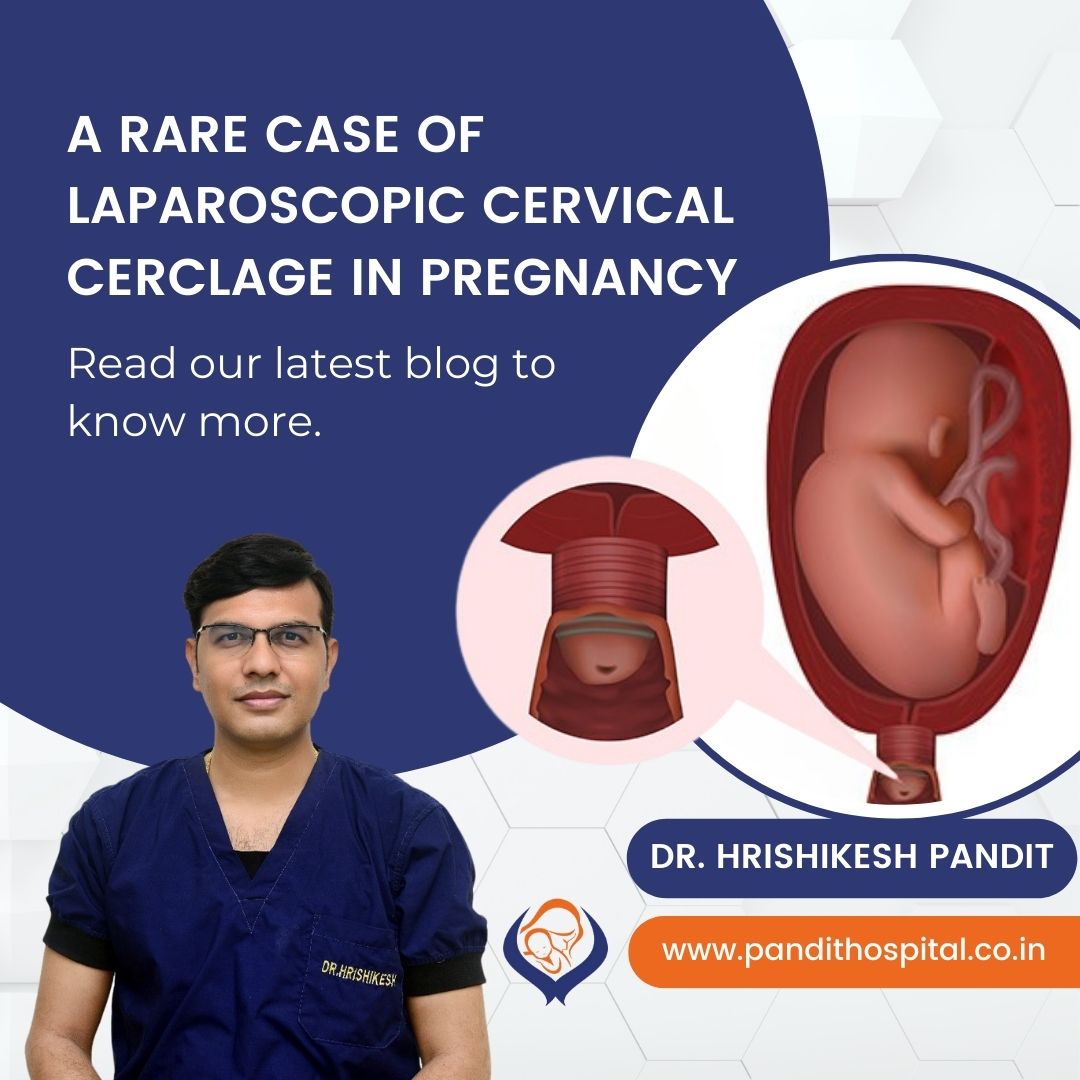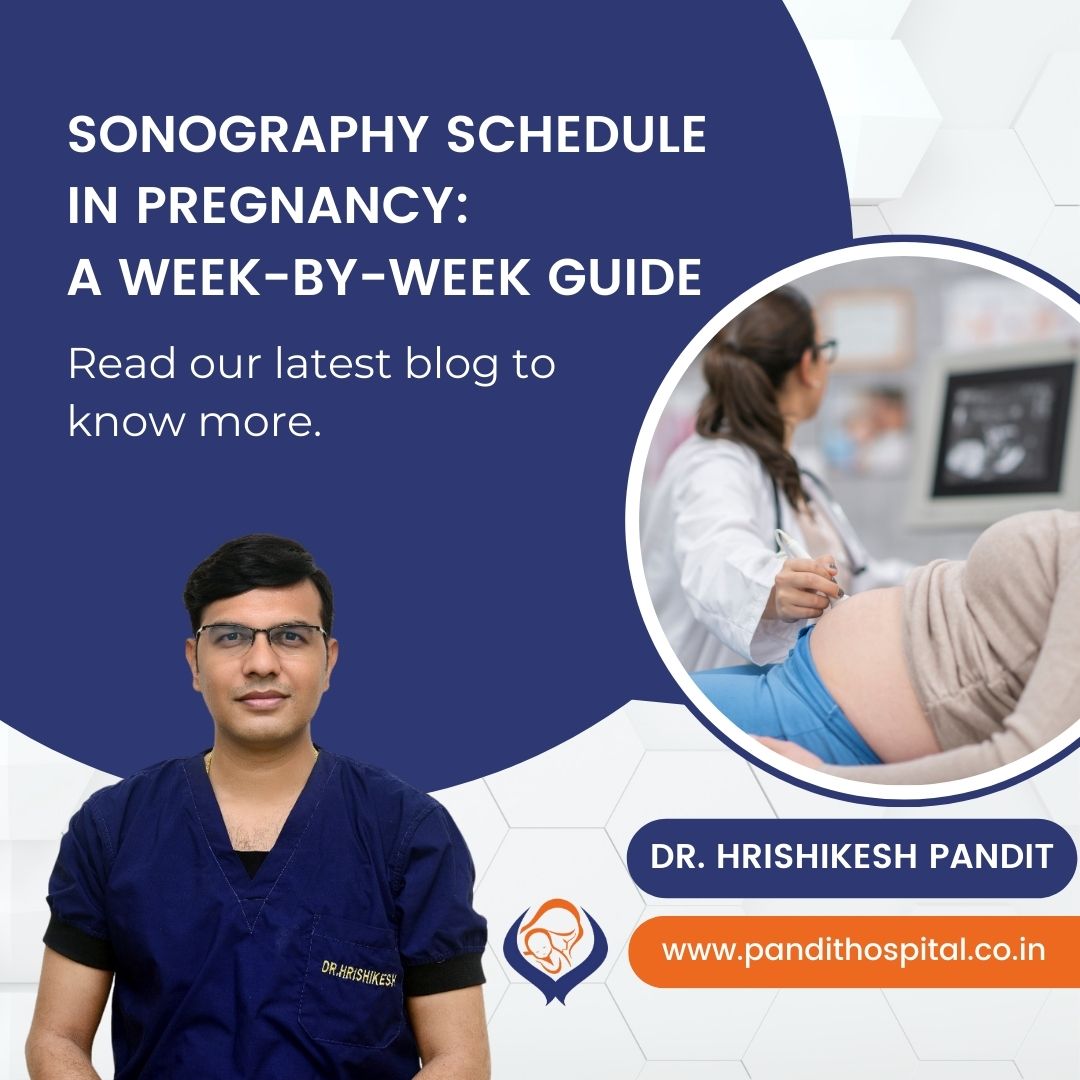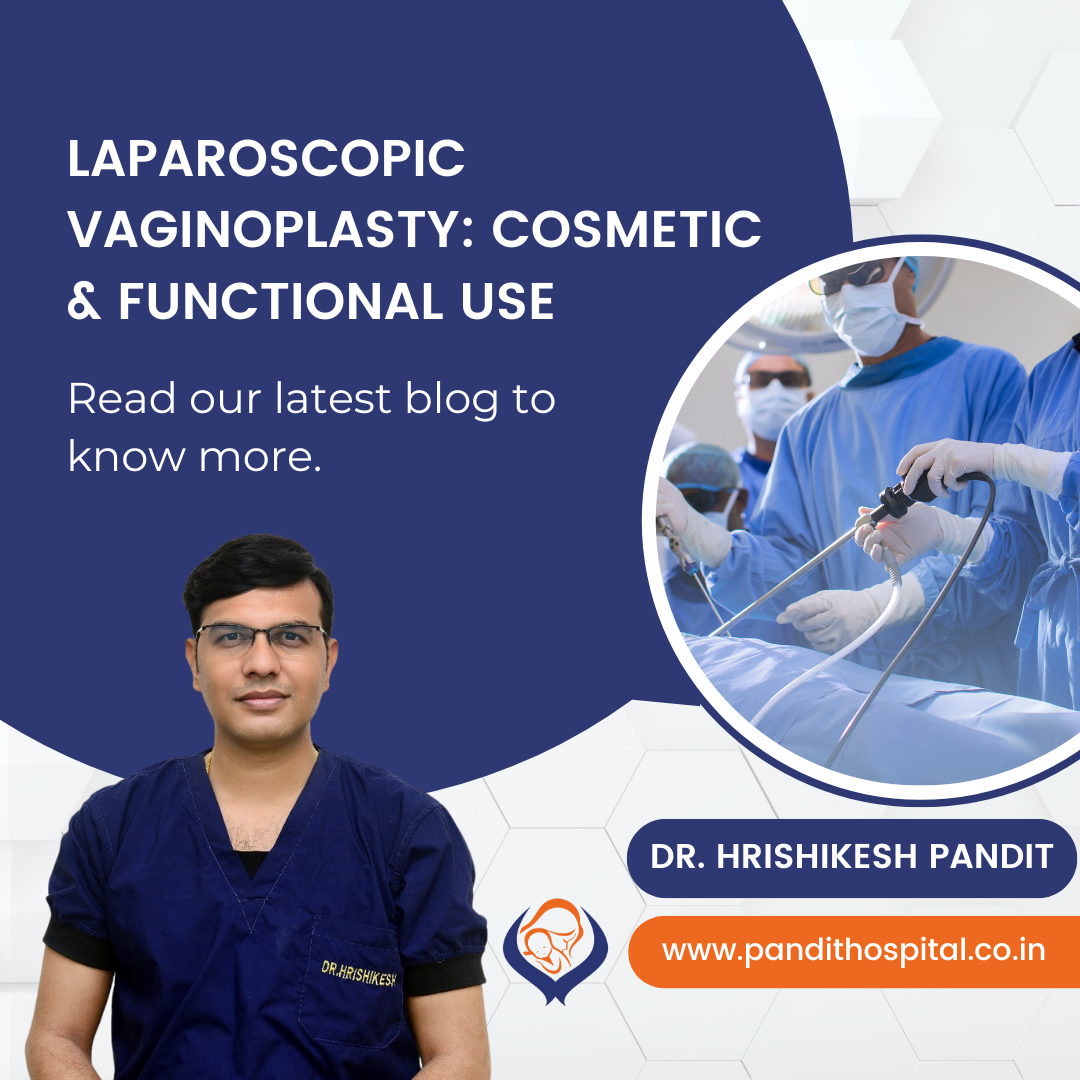Endometriosis is a condition in which the type of tissue that lines a woman’s uterus grows outside it. Even though there is no cure for endometriosis, laparoscopic surgery like Total Laparoscopic Hysterectomy TLH in Endometriosis helps in relieving symptoms. Dr. Hrishikesh Pandit is one of the best Laparoscopic Gynecologist in India to provide Endometriosis management through laparoscopy.
Recently Dr. Hrishikesh Pandit published one of his cases with

Total laparoscopic Hysterectomy Gr. 4 Endometriosis with Bowel Adhesiolysis and Ureteric Dissection, watch the video here,
What are the stages of endometriosis?
Stage 1 or minimal: There a few small implants or small wounds or lesions. They may be found on your organs or the tissue lining your pelvis or abdomen. There’s little to no scar tissue.
Stage 2 or mild: There are more implants than in stage 1. They’re also deeper in the tissue, and there may be some scar tissue.
Stage 3 or moderate: There are many deep implants. You may also have small cysts on one or both ovaries, and thick bands of scar tissue called adhesions.
Stage 4 or severe: This is the most widespread. You have many deep implants and thick adhesions. There are also large cysts on one or both ovaries.
What are the types of endometriosis?
Endometriosis is also grouped by what area of the pelvis or abdomen it affects. There are four main types:
Superficial peritoneal endometriosis. The peritoneum is a thin membrane that lines your abdomen and pelvis. It also covers most of the organs in these cavities. In this type, the endometrial tissue attaches to the peritoneum. This is the least severe form.
Endometriomas. These are dark, fluid-filled cysts. They’re also called chocolate cysts. They vary in size and can appear in different parts of your pelvis or abdomen, but they’re most common in the ovaries.
Deeply infiltrating endometriosis (DIE). In this type, the endometrial tissue has invaded the organs either within or outside your pelvic cavity. This can include your ovaries, rectum, bladder, and bowels. It’s rare, but sometimes a lot of scar tissue can bond organs so they become stuck in place. This condition is called frozen pelvis. But this only happens to 1%-5% of people with endometriosis.
Abdominal wall endometriosis. In some cases, endometrial tissue can grow on the abdominal wall. The cells may attach to a surgical incision, like one from a C-section.
Is it possible to treat stage 4 endometriosis?
Laparoscopic hysterectomy in severe pelvic endometriosis is feasible, and it should be the treatment of choice with the availability of expertise. It offers major patient benefits by avoiding major complications with quick recovery and reducing the recurrence with precise excision.
At Pandit Hospital, Ahmednagar; Dr. Hrishikesh Pandit has the experience of more than 5000 laparoscopic surgeries and has best 3D laparoscopy technology at his centre to provide best results.
What is the cost of total laparoscopic hysterectomy (TLH) in Ahmednagar?
It depends upon associated factors and pathology behind the requirement of the procedure. At Pandit Hospital, Ahmednagar, we provide total laparoscopic hysterectomy (TLH) at around ₹30,000.
Dr. Hrishikesh Pandit is the pioneer pf 3D laparoscopy technique in Ahmednagar. His experience and skill makes him one of the best laparoscopic surgeon in India.
At Pandit Hospital, you are in safe hands!
To consult Dr. Hrishikesh Pandit, Click Below,
Pandit Hospital – Best Maternity care center in Ahmednagar
LET’S SEE OUR INTRO VIDEO
At Pandit Hospital, we provide all the maternity services from antenatal to postnatal period under one roof
Let's Connect!!
0241-2441717 / 0241-2442344
info.pandithospital@gmail.com
About author:
Dr. Hrishikesh Pandit:
Dr. Hrishikesh Pandit is one of the best obstetrician and gynecologist in India. He is also a well-renowned Laparoscopic surgeon. He obtained his MS (Ob Gyn) degree from the prestigious Pravara Institute of Medical Sciences. He has also done fellowship and diploma courses in laparoscopic surgeries and cancer treatment from Tata Hospital and Keil University, Germany. His surgical cases, papers and videos has been chosen in many international forums of gynecology.
At Pandit Hospital, we are always working hard to provide its patients with the highest level of medical innovation and patient care. With the aim of delivering complete maternity & gynecological care under one roof with the help of all contemporary amenities and cutting-edge medical equipment. Dr. Hrishikesh Pandit has a vision to bring the best of facilities regarding laparoscopy surgeries in the city of Ahmednagar. He is the pioneer of 3D Laparoscopy technology is Ahmednagar.
Latest Articles
Dr. Hrishikesh Pandit is one of the best laparoscopy surgeons in India. His determination to bring 3D Laparoscopy technology to Ahmednagar has eventually helped so many patients. Read the latest articles by Dr. Hrishikesh Pandit on Gynecology, gastric issues, and health tips for mothers during pregnancy.
Laparoscopic Cerclage is done for cervical insufficiency or early abortion history. Consult Dr. Hrishikesh Pandit to know more about it. Excellent results in High Risk Pregnancies. Watch video on YouTube.
At Pandit Hospital, Ahilyanagar, we provide advanced maternity care with state-of-the-art 3D laparoscopy and sonography services to ensure the safety of both mother and baby.
Pandit Hospital, led by Dr. Hrishikesh Pandit, offers 3D laparoscopic treatments including Laparoscopic Vaginoplasty, to restore both form and function in women seeking vaginal reconstruction in india.
FAQ
You should consult a doctor during the first 6 to 8 weeks of your pregnancy, or when your period is 2 to 4 weeks late.
If your contractions are 5 minutes apart, lasting for 1 minute, for 1 hour or longer, it’s time to head to the hospital.
Doctors recommend an infertility evaluation if you have not gotten pregnant after 1 year of having regular sexual intercourse without using birth control. If you are older than 35, an evaluation is recommended after 6 months of trying.
Yes, You can. But most babies need 39 weeks to develop fully. Induced or planned delivery before that time—without a valid medical reason—is not in the best interest of the baby or the mother. After 39 weeks you can plan delivery.
Women who are 21 to 29 should have a Pap test alone every 3 years. HPV testing alone can be considered for women who are 25 to 29, but Pap tests are preferred. Women who are 30 to 65 have three options for testing. They can have a Pap test and an HPV test (co-testing) every 5 years. They can have a Pap test alone every 3 years. Or they can have HPV testing alone every 5 years.
Laparoscopic hysterectomy is a safe and suitable procedure for chosen patients. It affords patients advantages like less peri-operative morbidity, better life quality, shorter hospitalization time, and faster return to activity.
Schedule a doctor’s visit if you have: Greenish, yellowish, thick or cheesy vaginal discharge; Strong vaginal odor; Redness, itching, burning or irritation of your vagina or the area of skin that surrounds the vagina and urethra (vulva); Bleeding or spotting unrelated to your period.
Painless delivery can be achieved using a form of regional anesthesia that provides pain relief during natural labor. Epidural anesthesia is administered through an injection on the lower back of the mother. The drug takes about 10-15 minutes to take effect.
Even in severe cases of endometriosis, most can be treated with laparoscopic surgery. In laparoscopic surgery, your surgeon inserts a slender viewing instrument (laparoscope) through a small incision near your navel and inserts instruments to remove endometrial tissue through another small incision.
The HPV vaccine is recommended for routine vaccination at the age of 11 or 12 years. (Vaccination can be started at age 9.) It is also recommended that vaccination for everyone through age 26 years if not adequately vaccinated when younger. HPV vaccination is given as a series of either two or three doses, depending on age at initial vaccination.




